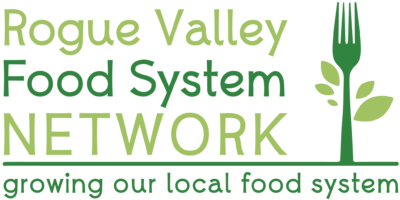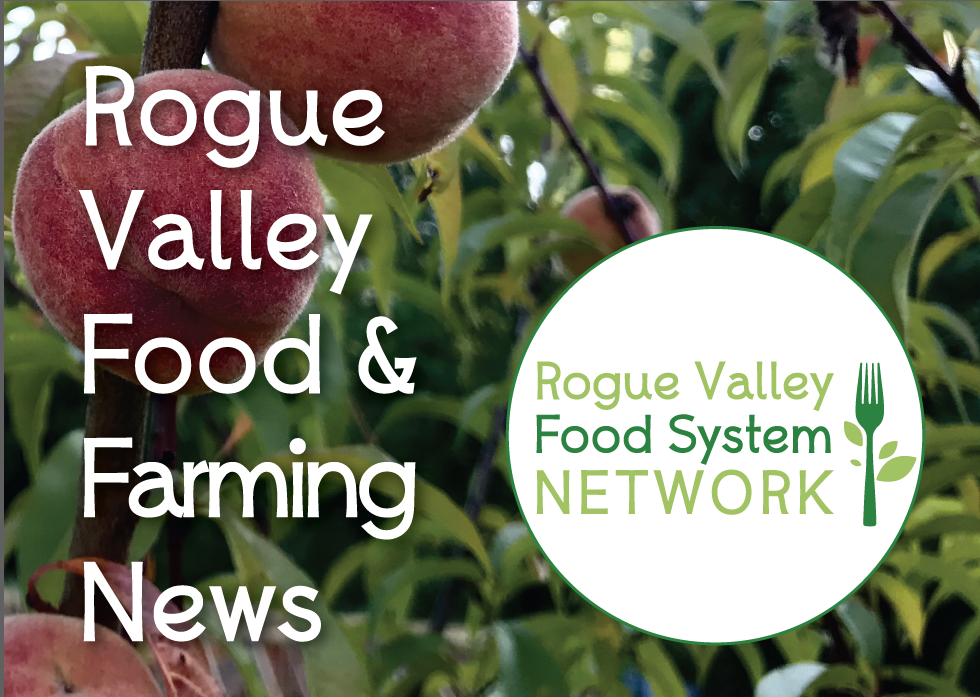
Rogue Valley Food System Network has its roots in the efforts of farmers, businesses and organizations — guided by Oregon Food Bank — to grow a thriving food system that alleviates hunger in Southern Oregon’s Rogue Valley.
Formed in 2013, RVFSN was born out of years of community assessments, begun in 2006, and forums to better understand the issues of food and hunger in Jackson County. Planning and coordination involved several nonprofits groups, including ACCESS, Leightman Maxey Foundation and the former small–business incubator known as Thrive.
From 2010 to 2012, these organizations studied nutrition education and the regional food system to create a community-based strategic plan for improving food security and self-reliance at the local level. Feedback arose during that time from nearly 400 people attending nearly a dozen community gatherings, known as FEAST workshops and Community Food Conversations. Food Education Agriculture Solutions Together (FEAST) is a community-organizing workshop model developed by Oregon Food Bank that allows participants to have informed discussions about food, education and agriculture in their communities.
These gatherings, held in 10 communities, identified specific topics, ideas and areas of concern, such as value-added food processing, nutrition education, healthy solutions for “food deserts,” community gardening and more. Community groups started, pursuing opportunities, working on projects and surveying stakeholders from all sectors of the food system to hear their perspectives, home in on key issues and work toward solutions. These stakeholders included farmers, ranchers, community-garden coordinators, food businesses, grocery store owners, chefs, food-pantry volunteers, food-pantry clients, food educators, compost specialists, land-use planners and government officials.
In 2012, neighboring Josephine County also completed its community food assessment under the direction of Josephine County Food Bank with financial support from AmeriCorps and Oregon Food Bank.
With funding from Meyer Memorial Trust, awarded to ACCESS and Thrive, community stakeholders created an action plan that ultimately established RVFSN. Several community recommendations were integral to the Network’s creation:
- Improve availability of resources related to the food system by centralizing them in one location, increasing opportunities to share information and connect food-system sectors.
- Provide leadership and increase partnerships across food-system sectors to improve the community’s overall food security.
- Develop a website as a centralized and comprehensive source of information for resources and activities related to food-system sectors.
- Maintain a list-serv for sharing information about food-system topics, events and needs.
- Map resources in each food-system sector to identify resources and gaps in services and to analyze trends.
- Provide networking opportunities through regular partner meetings and a Rogue Valley food summit.
- Establish a centralized, physical location for food-related organizations to work under one roof, promoting cross-collaboration.
- Involve local government in a food system council.
With these recommendations, RVFSN hired a full-time coordinator in 2016 with funding from a U.S. Department of Agriculture Community Food Grant awarded to ACCESS. Two years later, RVFSN merged with Thrive, formally adopting the RVFSN network name and gaining recognition as a tax-exempt nonprofit organization.
See the timeline below:
2006 – 55 people attend the 2006 Community Food Assessment Training led by Sharon
Thornberry of the Oregon Food Bank sponsored by Thrive and ACCESS.
2009 – In July and October, two Hunger Summit strategic planning events were initiated by the regional private funders’ learning community and focused initially on Jackson County as a pilot. The events were sponsored by the Jefferson Funders Forum Ad Hoc Committee, which included Gordon Elwood, Carpenter, and Oregon Community Foundation.
2010 – Thrive, a former small–business incubator, and ACCESS, the Community Action Agency of Jackson County, held two regional networking meetings to bring together organizations supporting food production and one meeting of food distributors, primarily food banks.
The local private philanthropy Leightman Maxey Foundation initiated community
nutrition strategic planning process among nutrition focused programs in the region to
identify strategies for increasing nutrition understanding, education and consumption in
alignment with their mission.
2011 – ACCESS and THRIVE stepped forward to submit an application for planning support for the region and received a $50,000 initial grant from the Meyer Memorial Trust. Gordon Elwood Foundation provided planning support to the 2012 implementation of the grant and facilitation support for Steering Committee meetings, with a goal of comprehensively assessing the regional food system to inform a community-based strategic plan for improving food security and local self-reliance.
2012 – Feedback was gathered from nearly 400 participants at community gatherings. These community food conversations, known as FEAST* workshops, were held in 10 communities in Jackson County. and identified specific topics, ideas and areas of concern, such as value-added food processing, nutrition education, healthy solutions for “food deserts,” community gardening and more.
In response to the FEAST conversations, community groups were formed, pursuing opportunities, working on projects and surveying stakeholders from all sectors of the food system to hear their perspectives, home in on key issues and work toward solutions. Stakeholders included farmers, ranchers, community-garden coordinators, food businesses, grocery store owners, chefs, food-pantry volunteers, food-pantry clients, food educators, compost specialists, land-use planners and government officials.
Gordon Elwood Foundation recruited local philanthropies from the Jefferson Funders Forum (Ford Family Foundation, Carpenter, Gordon Elwood, Cow Creek Umpqua Indian Foundation, Epstein Family through Oregon Community Foundation) to provide another $25,000 to support the lead organizations, ACCESS, THRIVE and UCAN.
A Steering Committee/Champions AKA Think Tank was recruited representing parts of the system for the Rogue Valley to guide a successful process and measurable outcomes for the strategic action plan to follow the assessment.
In 2012, neighboring Josephine County also completed its community food assessment under the direction of the Josephine County Food Bank with financial support from AmeriCorps and Oregon Food Bank.
With funding from Meyer Memorial Trust, awarded to ACCESS and Thrive, community stakeholders created an action plan that ultimately established RVFSN.
2016 – RVFSN hired a full-time coordinator with funding from a U.S. Department of Agriculture Community Food Grant awarded to ACCESS.
2018 – RVFSN merged with Thrive, formally adopting the name and gaining recognition as a tax-exempt nonprofit organization.


